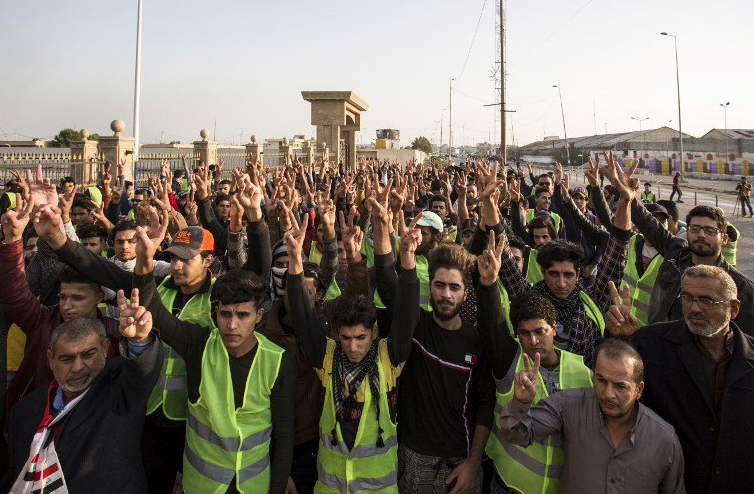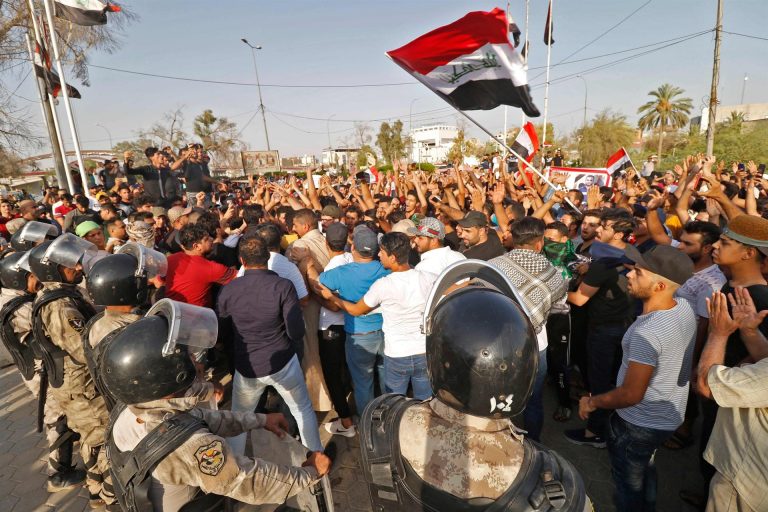Below, we publish an interview with an Iraqi-Kurdish activist about the situation in Iraq. Although we do not agree with all the conclusions drawn in the interview, we still think it will be of interest to our readers. The interview was conducted in August: that is, before the present protests, and before the forming of a new government in October. Nevertheless, it gives some very interesting background information about the processes going on in Iraq today.
The invasion of Iraq was a disaster for the Iraqi working class. Could you tell us a little about its consequences on society today?
After the US invasion of Iraq, most public factories were either closed or plundered and many others sold to the private sector. Many public service institutions were destroyed, such as hospitals and schools; including two of Iraq’s most-advanced medical laboratories, which in the view of the US were expected to have conducted chemical tests for weapons of mass destruction. This was not actually true, and was patent justification for the US’s planned war and invasion. The 2003 US invasion has also deepened ethnic and sectarian problems in the country.
Political and economic crises have skyrocketed. War, bombings, poverty, unemployment, internally displaced, terror, militias, bloodshed, oil plunder, corruption, regression in agriculture, international loans, privatisation and many other calamities have become the main characteristics of Iraq after 2003. Also, AL-Qaeda and ISIS emerged from the ashes of the profound crisis in Iraq, to the detriment of working-class struggle. All these atrocities and deep crises arising from Iraqi-USA relations in the country caused the working-class struggle to recede, because the Iraqi working class was seeking stability, peace, employment and their daily bread instead of a working-class revolution, which I consider the ultimate resolution of the problems facing workers, then and now.
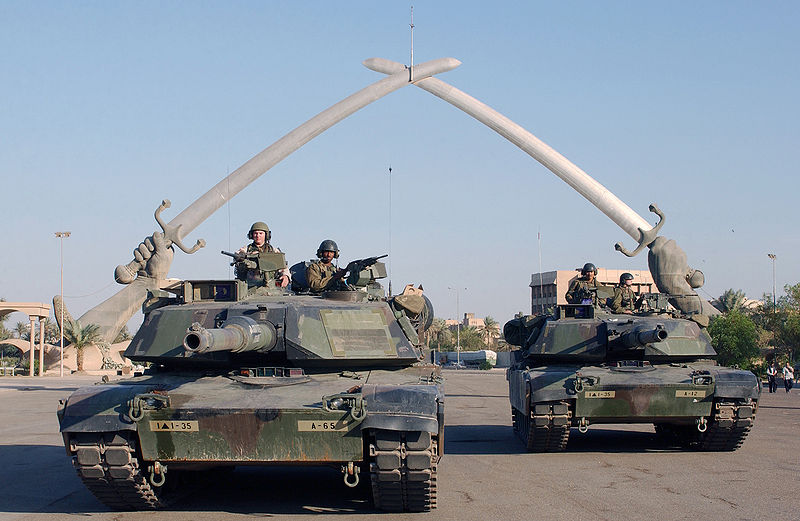 The invasion of Iraq was a disaster for the Iraqi working class / Image: John L. Houghton
The invasion of Iraq was a disaster for the Iraqi working class / Image: John L. Houghton
Could you tell us about the living conditions of the working class in Iraq today?
Conditions facing the working class are worse than ever. For instance, the rate of unemployment and joblessness increases every day, in particular among the youth, for whom unemployment is estimated at 40 percent in general and 69 percent for young women. Many children are seen working in the streets under catastrophic conditions. Wages have decreased dramatically. And relative to wages, the cost of living is very high. It is also estimated that 2.5 million homes are needed. There are too many workers living in rented accommodation, or are homeless, and the government has no plans to tackle this issue, nor any of our other pressing problems.
The Labour Law is also severely repressive. The workers are deprived of the right to self-organisation. The trade unions and syndicates are controlled by the bourgeoisie and their political parties. The workplaces are turned into military camps, as they are barricaded by security forces, and any discontented workers are readily punished and fired. The number of workers expelled from companies and factories is always rising because there is no job security. And so, these repressed workers are forced to bear their terrible working conditions with very low wages.
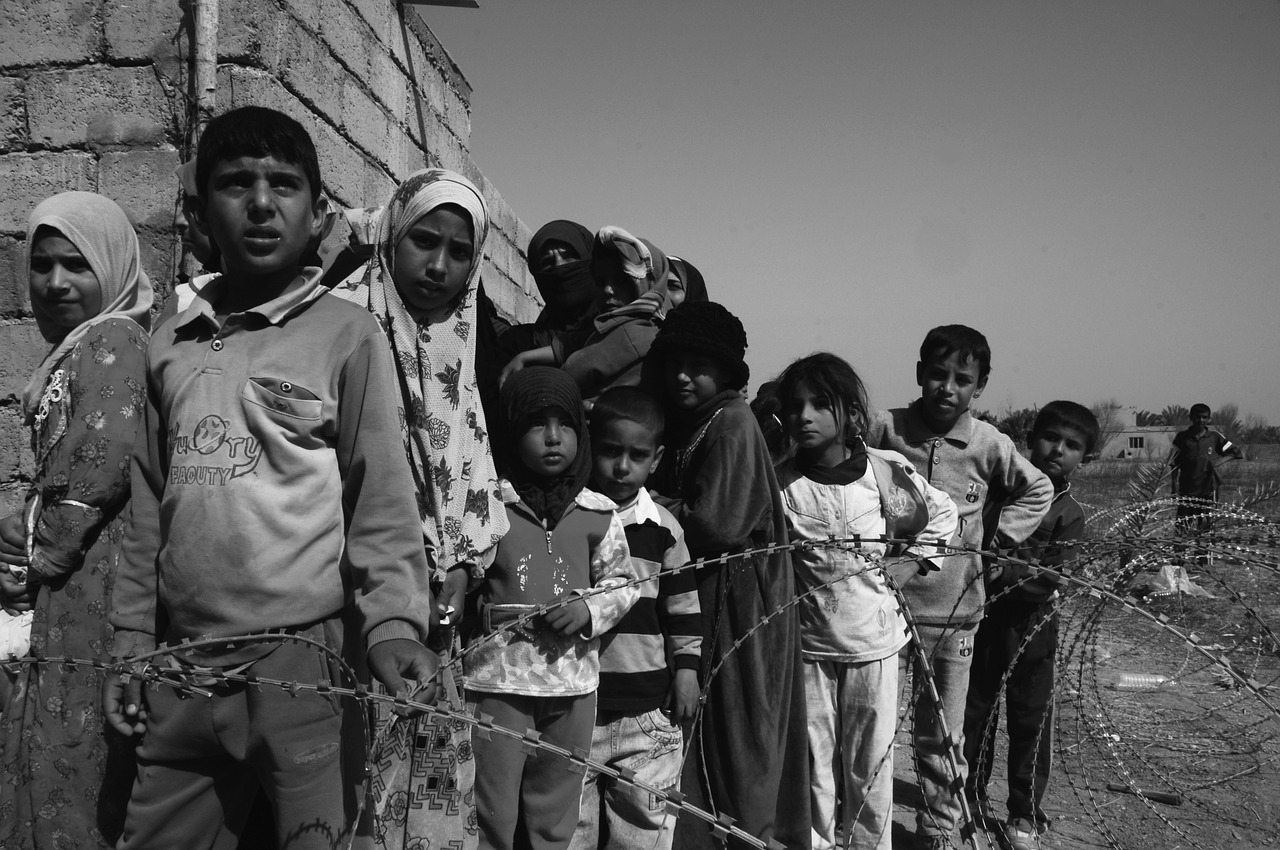 Conditions in the country are worse than ever / Image: Needpix
Conditions in the country are worse than ever / Image: Needpix
Additionally, the Kurdistan Regional Government (KRG) has formally stopped government employment in 2014, and the rate of employment in the Iraqi Central Government (federal government) has greatly decreased, even though both governments are in need of thousands of workers in various departments. Iraq is considered to have the highest proportion of young people of any nation, because of the effect of wars, poor medical services due to the destruction of the hospitals, and cuts to public services due to economic crisis and outright destruction.
In all, the country is rife with youth unemployment; wages and the rate of employment have dramatically decreased; and the privatisation of the public sector, and taxes on the workers, have greatly increased.
These problems facing the working class - arising from neoliberalism, bourgeois competition, and limited job opportunities - are increasingly disintegrating the working class, which altogether worsens their conditions throughout the country. Foreign workers’ conditions are far worse than the Iraqi workers. Most foreign workers are forced to work 10-to-16-hour days, earning very low wages, having no contracts in many cases, and are unable to speak up due to Iraq’s Labour laws. Also, women in the workforce are psychologically, physically and sexually abused. There are many private companies that bring foreign workers into Iraq, which is banned according to the Labour Law, and while many workers privately complain about their companies stealing their wages, they are always under threat of deportation if they dare to ask for their basic rights.
What kind of programme did the old government carry out in terms of labour laws, austerity, education, healthcare, privatisations etc?
There are two separate Labour Laws for the federal government and regional government (KRG). The Iraqi one is new (No. 37/2015), while Kurdistan still has the old law established at the time of Ba’ath Regime (No.71/1987). However, a better law, guaranteeing the working class legal rights, is needed from both governments, and this needs to be pushed by the working class. Workers must fight for such a law through forming their own independent organisations: committees with a clear, working-class vision and agenda. In addition, there is a new project by the UN, in alliance with the Iraqi government, for Iraq after the ISIS. It is specifically designated to increase privatisation and international loans, which will create more catastrophic conditions for the working class. As we mentioned, due to the bourgeois trade unions and syndicates, the project has been accepted, although it was rejected by a few independent organisations.
Both governments and their so-called working-class organisations are formally and informally against the betterment of workers’ conditions, which are deteriorating before their very eyes. The Iraqi government’s headquarters in Basra was set ablaze by locals frustrated at their wretched conditions. Protesters have blockaded and closed down Iraq’s main seaport at Umm Qasr, through which it imports most of its grain, and other supplies. Mortar shells have been fired into the Green Zone in Baghdad for the first time. At least 10 people have been shot dead by security forces over the last four days in a failed effort to quell the unrest. As a result, I believe that the causes of the demonstrations were and are still evident for the workers; and the same causes may lead to more violent demonstrations and strikes in the future.
Protests erupted last year because of the lack of electricity, water, jobs and every other governmental service. The injustice was all the more flagrant because the oil companies around Basra are exporting more crude oil than ever before. In August 2018, this totalled four million barrels a day, earning the government in Baghdad $7.7bn over the course of the month.
But despite its vast oil wealth, Basra was dangerously threatened by a cholera outbreak last year, according to local health officials. Basra hospitals treated 17,500 people for chronic diarrhoea and stomach ailments in only two weeks, after they became ill from drinking polluted water. There are plenty of bacteria around because the water system has not been updated for 30 years, and sewage from broken pipes is mixing with drinking water.
Has the new government taken any steps in this regard?
No. For the working class, there is no difference between the old and the new government. Both are deepening the workers’ miseries. Fortunately, the Iraqi workers did not trust the new government and it is crystal clear that they were right to distrust it.
Could you tell us about the Sadrist movement and the background of it coming to power?
Historically, there was a list of political players before the fall of Saddam Hussein. This included the Kurdish leaders Jalal Talabani and Mustafa Barzani; the secular Shiite politicians Iyad Allawi and the late Ahmad Chalabi; the Shiite Islamists Ibrahim al-Jaafari and Nuri al-Maliki; and the late clerical Shiite brothers Muhammad Bakr and Abdulaziz al-Hakim. One of the most intriguing additions to this group is the radical Shiite cleric Moqtada al-Sadr: an arriviste who had never held elected office before 2018, but commands thousands of supporters, and has established himself as a key power broker in the country.
“Moqtada,” as his followers call him, is a tough character: the son of a revered cleric who was murdered on Saddam’s orders in 1999. Sadr forced his way into the political scene, when he was still in his twenties, with a calculated act of violence. On 10 April 2003, three weeks into the U.S. invasion, Abdel Majid al-Khoei - a moderate Shiite cleric, whom the Americans had brought into Najaf, the holy city of the country’s minority Shiites, in the hopes that he would somehow help manage the city’s influential religious community - was stabbed to death. The word spread quickly that the assassination, which occurred in broad daylight in front of numerous witnesses, had been carried out by one of Sadr’s lieutenants, on his orders. The murder coincided with the appearance, on the streets of Najaf and Baghdad, of an armed rabble who called Sadr their leader and themselves his Mahdi Army. Within days, they had taken over the vast Shiite slum of Saddam City, which was renamed Sadr City.
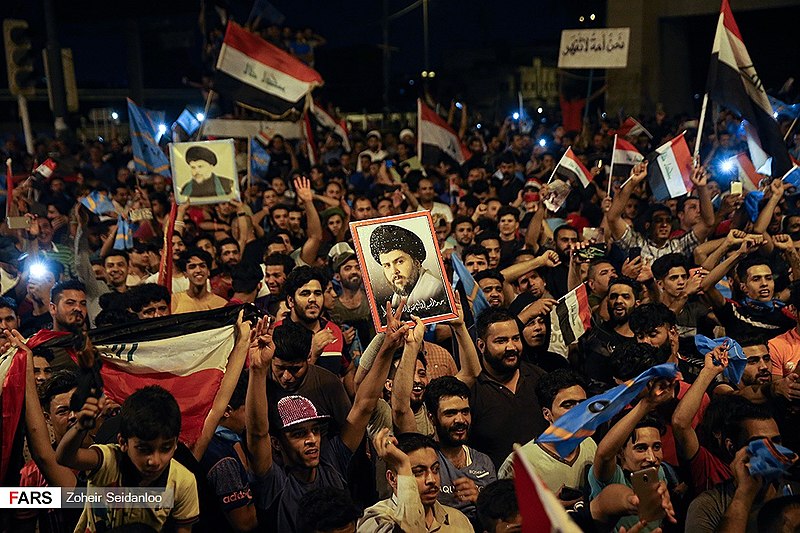 Shiite cleric Moqtada al-Sadr never held elected office before 2018, but commands thousands of supporters, and has established himself as a key power broker in the country / Image: Zoheir Seidanloo
Shiite cleric Moqtada al-Sadr never held elected office before 2018, but commands thousands of supporters, and has established himself as a key power broker in the country / Image: Zoheir Seidanloo
In 2003, he built up his power base and has been a key political figure ever since. Later, in April 2004, coinciding with the Sunni rebellion that began in Fallujah, Sadr’s Mahdi Army rose up and attacked coalition soldiers in Najaf, Baghdad, across southern and central Iraq, and inside Baghdad as well. The uprising had been sparked by the Americans’ arrest of one of Sadr’s aides, who was accused of Khoei’s assassination. As coalition troops and Sadr’s followers clashed, the Americans said that Sadr himself was wanted for the murder, and sent a large number of troops to surround Najaf. Sadr threatened to launch a full-fledged jihad if they entered the city. A standoff ensued. In the face of spreading violence, the Americans eventually withdrew.
Coalition forces fought the Mahdi Army several more times, always without resolution. Sadr’s soldiers were heavily implicated in the brutal sectarian violence of 2006 to 2008, but he has since renamed his army the Saraya al-Salam—the Peace Brigades—and now controls a big bloc in parliament, as well as his own political party. When two of his government ministers were accused of corruption, he ordered them to resign from their offices and to present themselves to the Iraqi courts. He is Shiite but has taken pains to show himself to be non-sectarian, embracing the Sunni-led “Arab Spring” demonstrations of several years ago, and more recently forming a committee, made up of secular Shiite, Sunni, and Kurdish intellectuals, to come up with a “national plan” for Iraq. But it is clear that he pushed back the class struggle by disintegrating the working class into more camps. Above all, this new, disastrous political scene was cultivated by US militarism in the region.
Sadr, in these conditions of political paralysis, knows how to choose his moments. Over the past two years, he has become big news as the representative of reform. He threatened the former PM Haider al-Abadi and his government for failing in their reformist promises. He was publicly standing against corruption and attracted a majority for his stance. In late February, Sadr resurfaced to demand action, and 100,000 of his followers joined him in one of Iraq’s biggest public demonstrations ever.
Sadr gave the government 45 days to come clean, and as the clock ticked down, thousands of Sadrists (a boisterous crew made up mainly of Shiites), camped noisily outside the Green Zone. Sadr threatened to storm the enclave with his followers if their demands were not met, but, in the end, he and the government agreed on a Solomonic denouement. Sadr alone stormed the Green Zone, allowed in by the guards, who greeted him affectionately. Later, Abadi’s government came up with an eleventh-hour planned government proposal, and the instability miraculously ended without a real solution to the crisis.
Abadi, who acquiesced to Sadr’s latest show of force, is a more inclusive figure than his predecessor, Nuri al-Maliki, who was hated by Sunnis and forced out in 2014, after the ISIS takeover of most of Sunni Iraq. How long Abadi survives, however, remains to be seen. At the very least, he knows he will have to contend with Sadr in order to retain stability in Iraq’s streets, and power for himself. In the rambunctious mosh pit of Iraqi politics, knowing how to survive is everything. At the rate he is going, Moqtada al-Sadr could well end up as the last man standing.
Now the Sadr movement is part of the government, and lies about the corruption and lack of reform for which he was previously such a strong critic. This is due to the lack of revolutionary class struggle on the part of the workers themselves, leaving the exploitative bourgeoisie to enact their policies in power, while atomising and repressing working-class struggle, preventing the emergence of revolutionary organisations.
What role did the communist party play in this regard and which position did they take in regard to the major problems facing Iraq?
The Iraqi Communist Party has no understanding of what is really happening in Iraq, either politically and economically. They have never held to a revolutionary Marxist programme. They cannot understand, or lack any desire to understand, the real situation, and we as the working class should point this out, clearly and without fear. Furthermore, internal conflicts in the party have had eaten it from within. There are many discontented members, and splits are occurring more frequently. None of the leaders of the CP or these splits has a working class-outlook, theory for struggle, nor revolutionary methods. Most of the conflicts are internal, having nothing to do with a revolutionary plan and programme for the workers, which means the splitter groups are no better for the cause of Iraqi workers or socialist revolution. Therefore, none of the changes in the party have had an impact on the Iraqi political scene in general, nor on the working class in particular, mainly because the party itself is one of the weakest and most marginal parties of Iraq.
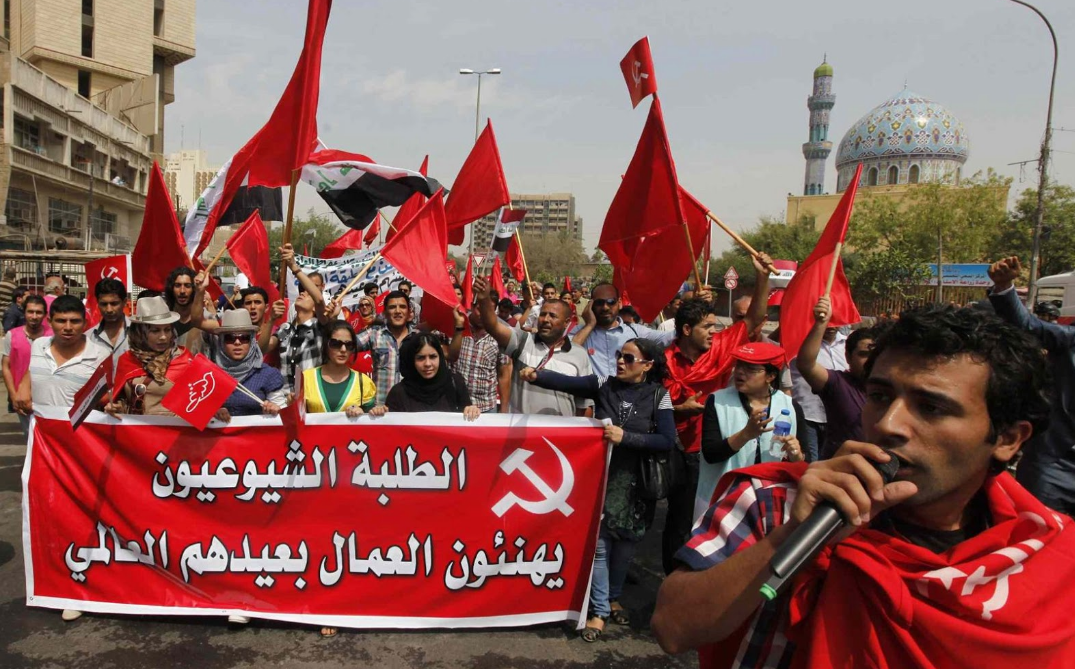
Could you tell us some more about the trade union movement in Iraq? How strong are they and which activities have they been involved in?
Answering this question is a bit difficult, because in Iraq before 2003 there were formal unions and syndicates, which were absolutely controlled by the state under the banner of ‘The General Union of the Iraqi Trade Unions.’ After 2003, this union and others were controlled by the new political parties; and their budget, which was collected from the Iraqi workers, was plundered like the rest of Iraq’s wealth, by these same political parties. It is worth mentioning that the radical workers who disagreed with the unions, either before or after 2003, came onto the scene and created their own organisations, which played an important role in demonstrations and strikes. But because the Iraqi Labour Law does not allow workers to form political organisations, and because Iraq had not signed any international law to give such a right, no formal organisation was established, and no enrolment of workers and cadres came about. Even the provision for self-organisation with a new law or agreement cannot guarantee workers a better life until the workers themselves practically fight for it on the ground.
Fortunately, in 2017, following working-class struggle and pressure from below, Iraq signed an agreement with the ILO for the freedom of workers’ organisations. But since then, Iraq has not issued any law for such a freedom. Despite the fact that Iraqi workers have taken the streets and announced strikes many times in the last few years, and although we were part of these strikes and have created our own working-class groups under various names, we could not create our own political working-class organisations and parties. This has so far prevented us from intervening in the upper echelons of politics and the economy: at the level of the government, companies, factories and living places of people. It is our immediate goal is to do so, and hopefully we are progressing. Importantly, we are fighting for such political freedom within and without local and international laws, and we strongly hold to a programme and strategy based on independent, political workers’ organisations; fighting for the creation of workers’ councils and soviets; and a radical revolutionary party for the whole of Iraq. This is not an easy task, because we still have difficulties in terms of the level of consciousness of the working class, not to mention interference from leftists, nationalists, reformists and sectarians with their own political parties and organisations, which have had a negative influence on the workers.
We consider this a new beginning for the Marxist youth and workers in Iraq, who believe in revolutionary theory and practice towards establishing workers’ political organisations; and who regard socialist revolution as the solution for the crisis in Iraq. We also believe that this cannot be done without having an international perspective. Therefore, in addition to our local struggles, we are looking for international bodies and organisations that apply Marxist revolutionary theory and practice to the political situation worldwide. Iraq is a somewhat unique situation for the international and local bourgeoisie, who have been deepening our problems and have been at a total impasse for a long time. This has been impacting the youths in particular. The American invasion has made the situation more complicated for revolutionary class struggle.
Have there been any significant strikes recently? What were they about, and how did they end?
In the last three years, the discontentment of government employees has taken the form of demonstrations and strikes. These were strong, and arose from the education, health, electricity and municipality sectors, and others. There is also discontentment in the private sector, but the workers there are intimidated into silence. All this anger stems from the exploitation of the workers due to the deep political and economic crisis. After the emergence of ISIS in 2014, the federal and Kurdistan regional governments claimed an exceptional war state. The KRG introduced and immediately implemented a plan of reducing government employees’ salaries to half, and then a quarter. They said the rest of their salaries would be saved and paid back after the war. For four years, the employees received four to five paychecks a year, with a huge amount of their salaries cut. The workers’ suffering led to many strikes and demonstrations. Yet, there is no hope of receiving this back pay. Many workers have reached the conclusion that the plan was to steal and plunder their salaries in the first place, and that the government has no intention of giving it back, because both governments formally announced the end of ISIS last year.
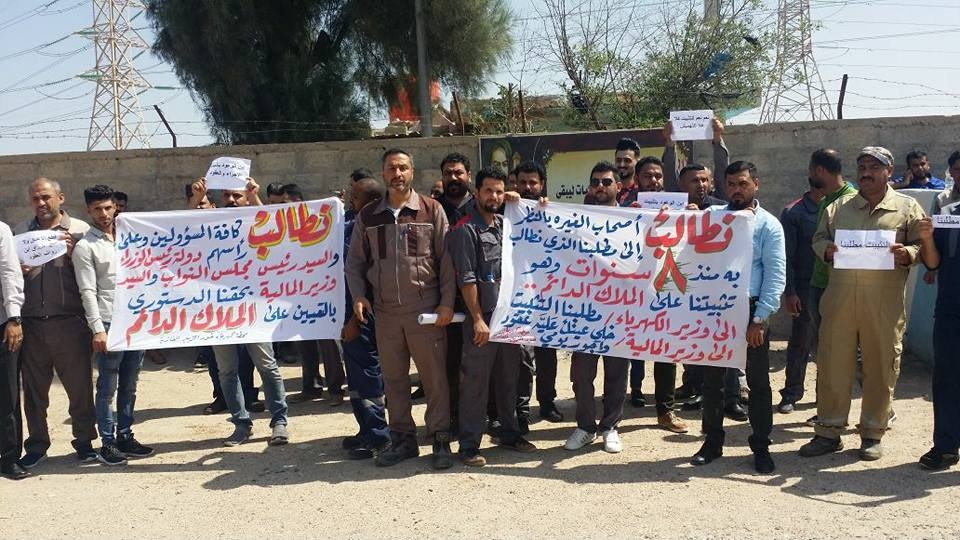 In the last three years, discontentment boiled over into demonstrations and strikes / Image: insutriall union
In the last three years, discontentment boiled over into demonstrations and strikes / Image: insutriall union
The demonstrations, from the beginning, took place in many Iraqi provinces, but mainly Basra and Sulaimaniyah and their surrounding cities and towns. Later, they sparked up in many more provinces, including both capitals, Baghdad and Hawler (Erbil). Everywhere, the demonstrations and strikes have been brutally repressed by the state military forces. Due to the lack of workers’ revolutionary organisations and parties, and the political absence of the communist parties in mass movements throughout Iraq, the bourgeois’ so-called opposition parties took advantage of the situation, and turned the workers’ struggles against the ruling parties. The workers’ economic demands, which were developing and taking on some political features, could not reach a revolutionary conclusion of a political fight against the entire Iraqi bourgeoisie. Thus, they were eventually controlled and misled. That is why there are new parties in power and in parliament, such as Sadr movement in Baghdad and New Generation in Kurdistan.
What has been the main character of the protest movement of the past few years and which demands have they taken up?
To begin with, in Kurdistan, cut and withheld wages, privatisation, unemployment, political crisis, war and corruption were the main targets of the demonstrations and strikes. In Iraq, opposition to privatisation, unemployment, political crisis, war, and corruption were the major slogans. The workers have now become more conscious of the current situation in Iraq, and have been attacking the state, the government, and both the ruling and opposition parties.
What are your thoughts about the Kurdish referendum last year? and what is the general situation in Iraqi Kurdistan today?
An independence referendum for Iraqi Kurdistan was held on 25 September 2017, with preliminary results showing approximately 93.25 percent of votes cast were in favour of independence. The referendum's legality was rejected by the federal government of Iraq. The Kurdish bourgeoisie leadership, in particular Masud Barzani, went ahead with the referendum regardless. But since there was no political or economic preparation by the Kurdish government and political leadership, the counter measures taken by the central government, created a dire situation for Kurdish workers, threatening their lives. We, representing a minority of communist groups and personalities not organised in the communist parties, have fought against the announcement of the referendum, because we did not see any advantage in such a thing for the workers. At that time, we wrote dozens of articles explaining why workers should not vote for such a referendum as it would only divide them. The referendum was mere bourgeois propaganda supported by a backward, nationalistic agenda. We clearly saw in the promise of independence more bondage for Iraqi workers, not freedom and unity. Unfortunately, the communist parties had either no stance or were supporting it locally and internationally. It was evident that they were influenced by Masud Barzani’s agenda and propaganda. Our understanding of the issue became clearer when the Kurdish workers paid dearly for the result, and it was Masud Barzani, his party (PDK) and others who regretted the implementation of the referendum. After the referendum, Kurdistan lost 50 percent of its land, which was again annexed by Iraq. The population of those areas (the disputed areas between Iraq and Kurdistan) have been suffering from displacement, war and plunder ever since.
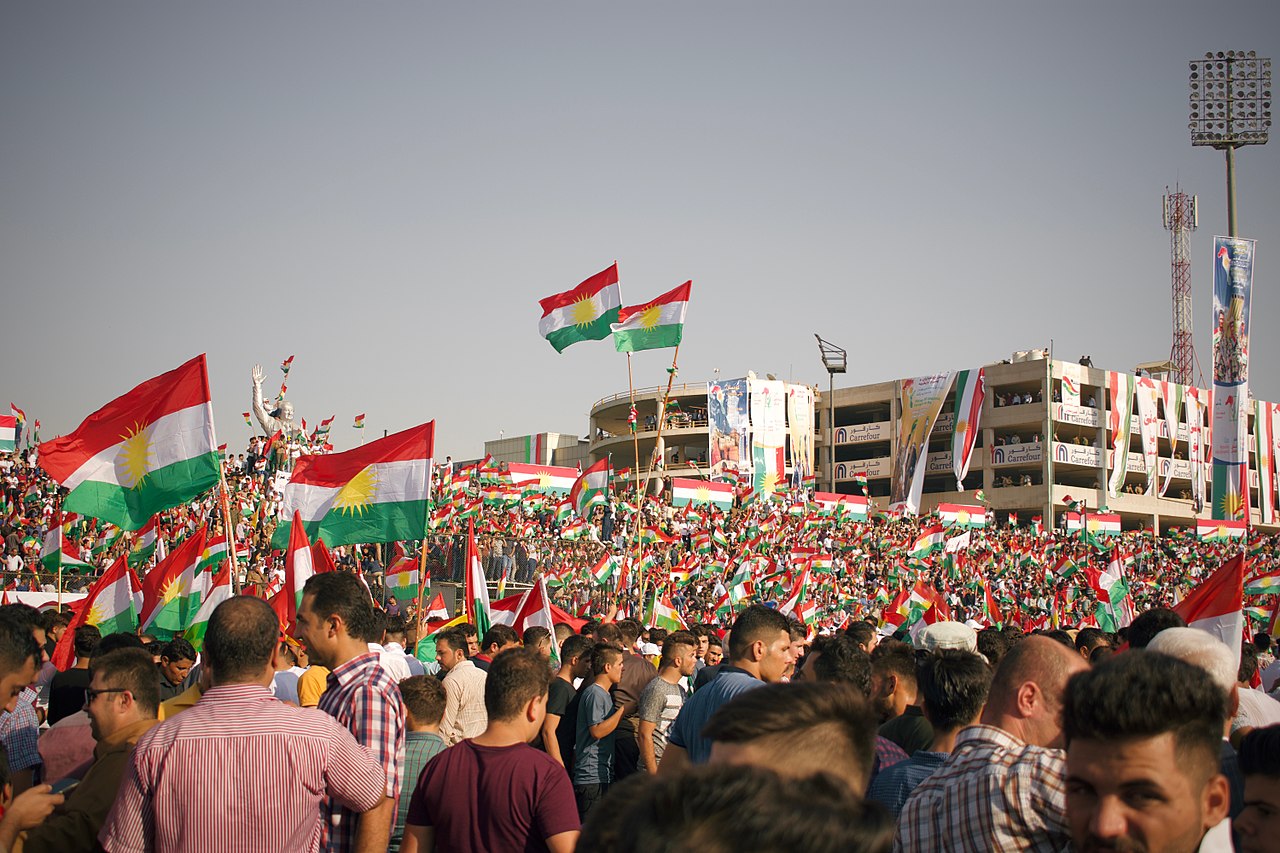 The Kurdish national question remains a major issue, but the only way out of the nightmare is working-class struggle for socialist revolution throughout the entire region / Image: Levi Clancy
The Kurdish national question remains a major issue, but the only way out of the nightmare is working-class struggle for socialist revolution throughout the entire region / Image: Levi Clancy
This referendum was originally planned to be held in 2014, amidst controversy and dispute between the regional and federal governments. Calls for Kurdish independence had been going on for years, with an unofficial 2005 referendum resulting in 98 percent voting in favour of independence. These longstanding calls gained impetus following the Northern Iraq offensive by IS and during the Iraqi Civil War, in which Baghdad-controlled forces abandoned some areas, which were then taken by the Peshmerga and controlled de facto by the Kurds. This brought no advantage either for the Kurds or other ethnicities in the area, because PUK (Jalal Talabani’s party) and PDK (Masud Barzani’s party) put their parties’ interests above all else.
We held all the Kurdish parties accountable for the miseries we were expecting to come about. On 7 June 2017, the Kurdish President Masud Barzani held a meeting with the Kurdistan Democratic Party (KDP), the Patriotic Union of Kurdistan (PUK), and other ruling parties, where the independence referendum was confirmed to be held on 25 September 2017.
The referendum led to a military conflict with the Iraqi central government, in which the KRG lost half of its territory and its main source of revenue: the Kirkuk oil fields. After the referendum, Masud Barzani resigned as president and shrugged his shoulders at the failure and the miseries brought to all of Kurdistan, and in particular the people living in those disputed areas, made up mainly of Kurds but also other ethnic groups.
Do you have other points that you would like to add or make?
The current situation in Iraqi is worse than ever for the workers. Fortunately, the majority of the workers have lost their trust in all the powers and parties of Iraq and do not listen to their promises. It is clear that Iraq’s governments and states have always been a heavy burden on the shoulders of the workers, and this has now has become part of their daily consciousness. The bourgeois crises have deepened, and the whole ruling class is at a terrible impasse. There is no hope of any transformation of the situation. At this moment, there is only one way out in Iraq: workers should create their own working-class organisations and revolutionary party, and forge links with other countries in the region and Marxist organisations worldwide. We need to take every step towards socialist revolution, the seizure of power and establishing a society run in the interests of the workers. This is what we believe in, and what we fight for every day.
